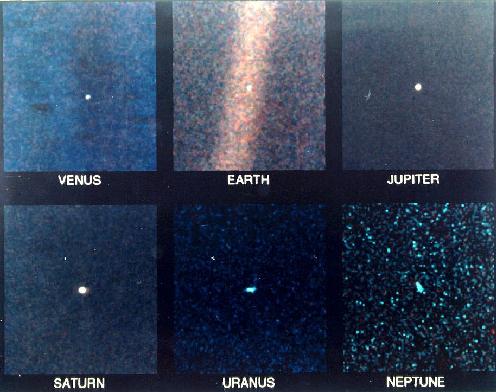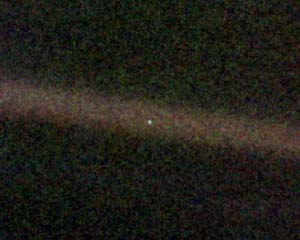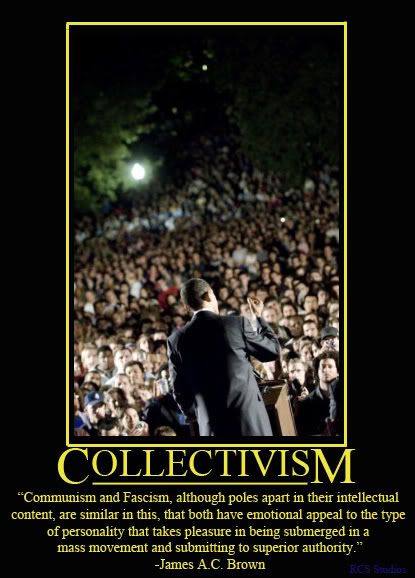3.6 billion miles away, the cameras photographed the Sun and visible planets (Pluto and Mars were too small to see from that distance and Mercury was lost in the glare of the Sun).

Among those visible was the Earth. It showed up as a mere blue pixel at such a huge distance. For the first time, humanity was now able to see visually what Copernicus and Galileo had proven centuries earlier: that humanity was far from the center of the universe and that for all intents and purposes, we are insignificant in the grand scheme of things.

However, there is one thing that ought to hit home about this photograph. We might indeed be insignificant overall, but so far, we as humans are very unique in the universe as the only intelligent civilization on the only planet that is known so far to have life on it. Carl Sagan had some memorable words to deliver on the subject of this dichotomy:
Look again at that dot. That's here. That's home. That's us. On it everyone you love, everyone you know, everyone you ever heard of, every human being who ever was, lived out their lives. The aggregate of our joy and suffering, thousands of confident religions, ideologies, and economic doctrines, every hunter and forager, every hero and coward, every creator and destroyer of civilization, every king and peasant, every young couple in love, every mother and father, hopeful child, inventor and explorer, every teacher of morals, every corrupt politician, every "superstar," every "supreme leader," every saint and sinner in the history of our species lived there – on a mote of dust suspended in a sunbeam.
The Earth is a very small stage in a vast cosmic arena. Think of the rivers of blood spilled by all those generals and emperors so that, in glory and triumph, they could become the momentary masters of a fraction of a dot. Think of the endless cruelties visited by the inhabitants of one corner of this pixel on the scarcely distinguishable inhabitants of some other corner, how frequent their misunderstandings, how eager they are to kill one another, how fervent their hatreds.
Our posturings, our imagined self-importance, the delusion that we have some privileged position in the Universe, are challenged by this point of pale light. Our planet is a lonely speck in the great enveloping cosmic dark. In our obscurity, in all this vastness, there is no hint that help will come from elsewhere to save us from ourselves.
The Earth is the only world known so far to harbor life. There is nowhere else, at least in the near future, to which our species could migrate. Visit, yes. Settle, not yet. Like it or not, for the moment the Earth is where we make our stand.
It has been said that astronomy is a humbling and character-building experience. There is perhaps no better demonstration of the folly of human conceits than this distant image of our tiny world. To me, it underscores our responsibility to deal more kindly with one another, and to preserve and cherish the pale blue dot, the only home we've ever known.

That passage of Sagan's instantly made me think of the state and statism as being the primary cause of all of humankind's problems. Surely, the abolition of the state will not end violence and misunderstanding among man, as man is a fallible creature. However, the biggest problem among humanity and the primary cause of our division is undoubtedly the state.
The state actively promotes this misunderstanding by violently forcing people to live in a certain way. Every individual's morals, beliefs, hopes, and dreams, are different. The state ignores this fact with its violent monopoly. It forces the individuals the it claims jurisdiction over to conform to its wishes. To solidify its power base, the ruling class that the state fosters often invokes a spirit of the greatness of a certain group to demonize outsiders or members of a different ethnic group or class. The "endless cruelties" that Sagan spoke of inevitably follows. We saw this recently in Rwanda in 1994, and more recently, in Sudan in the present day. For more historical examples, we ought to look toward the Rape of Nanking in World War II and the atrocities of the French Revolution.
There are countless other examples, but I cited these to show that the "cruelties visited by the inhabitants of one corner of this pixel on the scarcely distinguishable inhabitants of some other corner" are not just the work of Europeans and their descendants against non-Westerners as the current vogue of political correctness would have so many people believe. The problem is not one group of people, the problem is the ideology of collectivism, and the institution of a state is the ultimate expression of collectivism.

By legitimizing the initiation of violence and instituting group thinking, the inevitable result will be violence in favor of one group or another, with the perceived inferiors or outsiders suffering. Statism is responsible for every atrocity and tragic war in recorded history. It is a religion that demands constant blood sacrifice. This is all in the name of attaining some perceived good, of course. In ancient times, this was such things as bringing "civilization" to the "barbarians," or more brazenly, the glory of conquest.
Of course, these things still very much exist, only now they are disguised in more likable language, such as "freeing people from tyranny" or "spreading democracy around the globe."
The problem is, even to those that are good intentioned about such things, in essence this is telling other people how to live. Thus it falls into the same trap- collectivism. Those who disagree over how the state tells them to live must then be sacrificed in the name of the so-called majority that the state serves (in reality, in the interest of the state itself, and the of the ruling class that it fosters.) Inevitably, those whose way of life is being threatened will fight back, as we've seen from the 300 Spartans to Sitting Bull at the Battle of the Little Big Horn.
The state has always- and will always, cause needless bloodshed. It will always divide people into different groups and then favor one over another. This is why the Pale Blue Dot has been tainted so red with blood over the eons.

Humanity must come to the realization that there is no right way to live, except to live nonviolently. You or me cannot tell Jane what she must value, how she must raise her children, or what she must do with her money (though we may attempt to use the power of friendly persuasion). If such a thing was attempted Jane would laugh in our face, and if we persisted and brought some guns in, she'd probably get exceedingly angry and only grudgingly accept our values because of the violence we threaten her with.
This most people would generally agree with, but why then do they accept that kings or committees can do what we ourselves cannot? This is an utter absurdity. It is this tension that results from the organized violence of the state that has proven so tragic over history.
It is long past due that humanity emphatically reject collectivism, and its extension, the state, in all its forms. We must recognize the fact that we belong to only one distinction: individual human beings who live on Planet Earth. "Only then can we deal more kindly with one another through mutual understanding rather than pointing guns in each other's faces, and preserve and cherish the Pale Blue Dot."


No comments:
Post a Comment